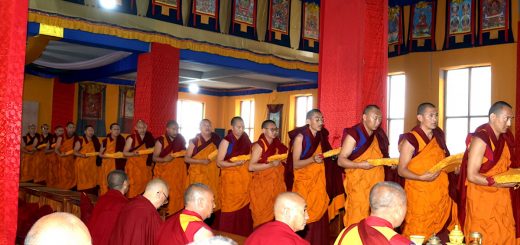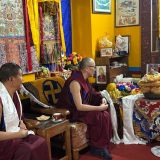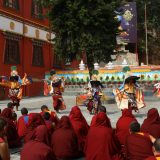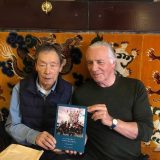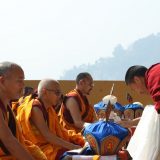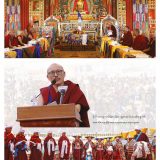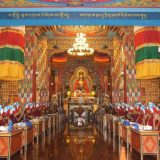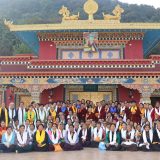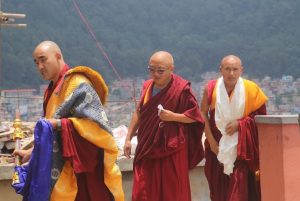SORIG BUMSHI SCHOOL
INTRODUCTION SORIG BUMSHI SCHOOL
Sorig Bhumshi School was established by late Amchi Ragshi Tsultrim Sangye at Norzinling Settlement in Dhorpatan, Baglung District of Nepal in 1988. Since then, it has been serving people from different places, particularly from Dhorpatan, where the modern amenities have not touched even today. It is deprived of road transportation, telecommunication and modern health facilities. Tsultrim Sangye served his clients tirelessly by providing herbal treatments as well as conducting necessary rituals to dispel malevolent energy influences. Later, he put efforts to transfer his knowledge to his students without any discrimination.
He was particularly known for his incomparable skills treating tumour related patients who often were rejected by modern health facilities. Beside Baglung District; people from Myagdi, Rukum and many other Districts visited him by walking for weeks to receive his treatments. His unparalleled expertise glorified Sowa Rigpa medical science as a whole and he also published many articles about this ancient science in numerous publications.
Since 1990, he started spending his winter time in Kathmandu by treating patients in the valley and teaching Sowa Rigpa as well as Tibetan languages to his students in Kathmandu. During the time, he managed to obtain all necessary empowerment, transmissions and initiations from H.E. Yongzin Rinpoche to both of his students and teaching colleagues.
During 1997, the school building had been expanded with the kind financial support from Mrs. Yvette Pottier, AIDE A L’enfance through Snow Lion Foundation, Kathmandu.
In 2004, Sorig Bhumshi’s medical curriculum received required accreditation under the Central Council of Tibetan Medicine (CCTM), India with the great efforts from Geshe Yungdrung Gyaltsen and Amchi Thome. Besides they also managed to avail at least one membership seat reserved for Bonpo Amchis in the Council.
Since 2006 the school is being operated under the supervision of Bonpo Foundation, which is a recognized organization under the Government of Nepal. In the last more than 30 years; 8 batches of Kachupas and Menrampas have been successfully graduated from the school and many of whom, have been serving people from all around the world.
School facilities:
Physically, the school consists of dormitories, an inspection room, classrooms, a herbal mil, a computer lab, a meditation room, a medical store room, a pharmacy, a massage room and a kitchen. Pedagogically, the school provides advance Tibetan language and in-depth astrological studies and medical studies mainly from the Bhumshi (four sutras) texts with several Gyushi references. Besides, as the diseases need medicines while the malevolent influences or harmful energies require rituals students are equipped with varieties of ritual practices for the same; which is also a part of the mind trainings that students received based on love and compassion. Likewise, students are provided with extra language classes mainly English and Nepali along with the Histories of Bonpo medical tradition with its practices in ZhangZhung, Tibet and Himalayan regions. The school also conducts different seminars, workshops, educational tours for students to broaden their knowledge.
Practical Field Visit:
Annually, a practical field visit into a high mountainous community is conducted for all students. These visits help students understand the physiology of plants in their natural form; their shapes, colours, types of branches, leaves, fruits, roots, tastes, smell etc. This is carried out in different places so that students notice the physiological differences of plants as the altitudes of the place changes. Furthermore, the primary objective of the visits is to provide students a hands-on knowledge and let them do a comparative study with the theories they learn in the classrooms and are taught the differences between fresh and dry use of plant parts as according to the Medicine Buddha, more than 400 types of medicines are compounded in the form of Powder, liquid and pills.
Social Service:
The school clinic provides free check up service to patients while medicines are charged with a minimal cost but these services are provided without any cost to families having a struggling economic background. During the earthquake in Nepal in year 2015, our clinic offered free medication services to thousands of patients in Kathmandu and around. Likewise, our clinic supports several rural mountainous communities in Nepal with free medicines as well as Amchi placement as most of these places are being deprived of modern medical facilities due to their extreme remoteness. This also includes conducting required rituals to dispel the energies obscuring the life forces for the living and the last rites for the dying. Furthermore, during the Covid 19 Pandemic; our clinic rendered preventive measures for general public and medicines for the positive cases along with necessary prayers and rituals for the deceased as much as possible.
Students’ background:
We always stand against all kind of discriminations; amongst races, casts, religions, gender and socioeconomic status while enrolling pupils but they should be able to read, write and speak Tibetan and should have keen interest with self confidence in taking on the course.
Since its inception, our school has been providing food, accommodation and education for its students without any cost. Currently, more than 20 students are being enrolled in the school. They are from Tibet, Dolpa, Mustang and Humla District of Nepal. Our objective is to provide them a future, and ways to give back to their respective communities and eventually to preserve the Sowa Rigpa tradition for the next generations.
School Curriculum:
The first-year students are introduced to the Sky-blue Heart Sutra (ཐུགས་འབུམ མཁའ་སྔོན) which is the root text for other medicine sutras and trained to recognize urines and feces from White Medical Sutra.(སྨན་འབུམ་དཀར་པོ་) The second-year are taught primarily on formation of powder, liquid and pills forms of medicines from the Medical Sutra and understanding the three humours from the Disease Sutra(ནད་འབུམ་ནག་པོ). The third-year students are taught about diseases related to heat and cold. The fourth-year students are taught primarily on diseases related to head and other organs based on the Diseases Sutra. The fifth-year students are taught on complete human physiological development from birth to death based on Inspection Sutra(དཔྱད་འབུམཁྲ་འོ). The sixth-year students are allowed to have a yearlong hands- on experience and revisions; working closely with teachers and seniors. Students are certified as ‘Kachupas’ only after successfully passing the sixth-year final examinations.
The seventh year students are made capable of recognizing harmful energies and poisonous disease as per the Disease Sutra and medicinal
plants as per the Medicine Sutra. The eighth-year students are made capable of understanding the five pharmaceutical procedures, and minor operations methods based on the Medicine Sutra. The ninth-year students are allowed to gain extra hands-on experiences and taught from different reference books besides regular Bhumshi books. The students are awarded with the Menrampa certificates after successfully passing the ninth-year final examinations. The major Examinations are taken twice a year with six months difference and they are done verbally (memorizations) and in written.
Besides, they are provided classes on modern science mainly biology to make them familiar with the aspects of modern medicines and senior Amchi guest speakers are invited on the regular basis for our students to broaden their knowledge as well as to understand the importance of the knowledge. On the other hand, hands-on trainings to students on daily basis is provided to enhance their practical knowledge. Likewise, a week-long early ritual of Medicine Buddha and a special Medicine Buddha ritual in every 8th day of lunar month are conducted to provide them the practical knowledge about rituals. On the weekly basis, every Friday, an in-house seminar is organized among students and a student is asked to speak on a subject of his or her choice. The speaker is rotated among the students. Likewise, students do daily morning and evening prayers as well as regular debate or logical practices among themselves on their medicine studies. The school produces annual school book named “Chebu Trishe” comprise of articles from students. This is the results of their yearlong learning and logical practices.
Note: English translation works are done by Mr. Tsewang Norbu Lama


